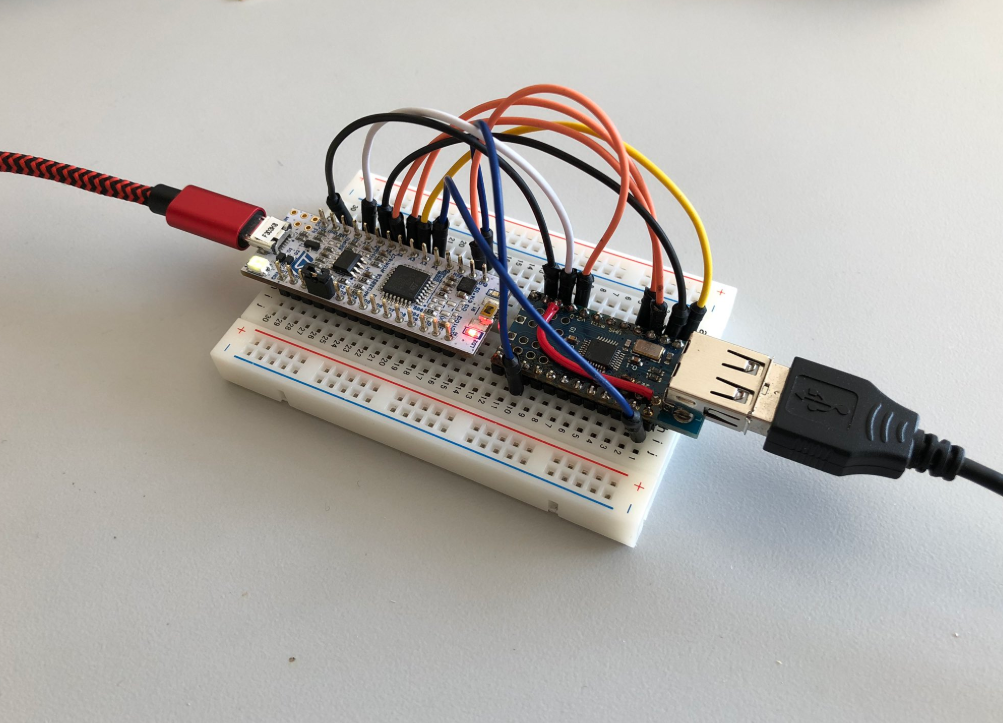Library to use Arduino USB host shield on mbed
ArduinoのUSB Host Shield 2.0をmbedで使えるようにしたライブラリです。
大体のコードがArduinoからそのまま移植可能です。
Arduino UNOやMega用のホストシールド以外にもミニサイズのホストシールドでも使用可能です

シールドについて
3.3VのI/O用にシールドの改造が必要になりますがネット上に記事がたくさんあるのでそちらを参考にしてください
接続例

使い方
Arduinoのコードと違うのはUSBのインスタンスの宣言部分のみです。
ピンを自分で指定できるようにしたので使いやすくなりました。
仕様
- Arduinoのmillis関数、micros関数の移植のために内部でTimerクラスを使用しています。
main.cpp
#include "mbed.h"
#include <PS3BT.h>
#include <usbhub.h>
Serial pc(USBTX, USBRX, 115200);
//Nucleo f303k8用
USB Usb(A6, A5, A4, A3, A2); // mosi, miso, sclk, ssel, intr
BTD Btd(&Usb);
PS3BT PS3(&Btd);
int main()
{
bool printAngle = false;
if (Usb.Init() == -1)
{
pc.printf("\r\nOSC did not start");
while (1); // Halt
}
pc.printf("\r\nPS3 USB Library Started");
while (1)
{
Usb.Task();
if (PS3.PS3Connected || PS3.PS3NavigationConnected) {
if (PS3.getAnalogHat(LeftHatX) > 137 || PS3.getAnalogHat(LeftHatX) < 117 || PS3.getAnalogHat(LeftHatY) > 137 || PS3.getAnalogHat(LeftHatY) < 117 || PS3.getAnalogHat(RightHatX) > 137 || PS3.getAnalogHat(RightHatX) < 117 || PS3.getAnalogHat(RightHatY) > 137 || PS3.getAnalogHat(RightHatY) < 117)
{
pc.printf("\r\nLeftHatX: %d", PS3.getAnalogHat(LeftHatX));
pc.printf("\tLeftHatY: %d", PS3.getAnalogHat(LeftHatY));
if (PS3.PS3Connected)
{ // The Navigation controller only have one joystick
pc.printf("\tRightHatX: %d", PS3.getAnalogHat(RightHatX));
pc.printf("\tRightHatY: %d", PS3.getAnalogHat(RightHatY));
}
}
// Analog button values can be read from almost all buttons
if (PS3.getAnalogButton(L2) || PS3.getAnalogButton(R2))
{
pc.printf("\r\nL2: %d", PS3.getAnalogButton(L2));
if (!PS3.PS3NavigationConnected)
{
pc.printf("\tR2: %d", PS3.getAnalogButton(R2));
}
}
if (PS3.getButtonClick(PS))
{
PS3.disconnect();
pc.printf("\r\nPS");
}
if (PS3.getButtonClick(TRIANGLE))
pc.printf("\r\nTriangle");
if (PS3.getButtonClick(CIRCLE))
pc.printf("\r\nCircle");
if (PS3.getButtonClick(CROSS))
pc.printf("\r\nCross");
if (PS3.getButtonClick(SQUARE))
pc.printf("\r\nSquare");
if (PS3.getButtonClick(UP))
{
pc.printf("\r\nUp");
PS3.setLedOff();
PS3.setLedOn(CONTROLLER_LED4);
}
if (PS3.getButtonClick(RIGHT))
{
pc.printf("\r\nRight");
PS3.setLedOff();
PS3.setLedOn(CONTROLLER_LED1);
}
if (PS3.getButtonClick(DOWN))
{
pc.printf("\r\nDown");
PS3.setLedOff();
PS3.setLedOn(CONTROLLER_LED2);
}
if (PS3.getButtonClick(LEFT))
{
pc.printf("\r\nLeft");
PS3.setLedOff();
PS3.setLedOn(CONTROLLER_LED3);
}
if (PS3.getButtonClick(L1))
pc.printf("\r\nL1");
if (PS3.getButtonClick(L3))
pc.printf("\r\nL3");
if (PS3.getButtonClick(R1))
pc.printf("\r\nR1");
if (PS3.getButtonClick(R3))
pc.printf("\r\nR3");
if (PS3.getButtonClick(SELECT))
{
pc.printf("\r\nSelect - ");
PS3.printStatusString();
}
if (PS3.getButtonClick(START))
{
pc.printf("\r\nStart");
printAngle = !printAngle;
}
if (printAngle)
{
pc.printf("\r\nPitch: %.3lf", PS3.getAngle(Pitch));
pc.printf("\tRoll: %.3lf", PS3.getAngle(Roll));
}
}
else
{
pc.printf("not connect\n");
}
}
}
USB_Host/message.cpp
- Committer:
- robo_ichinoseki_a
- Date:
- 2020-05-02
- Revision:
- 1:da31140f2a1c
- Parent:
- 0:b1ce54272580
File content as of revision 1:da31140f2a1c:
/* Copyright (C) 2011 Circuits At Home, LTD. All rights reserved.
This program is free software; you can redistribute it and/or modify
it under the terms of the GNU General Public License as published by
the Free Software Foundation; either version 2 of the License, or
(at your option) any later version.
This program is distributed in the hope that it will be useful,
but WITHOUT ANY WARRANTY; without even the implied warranty of
MERCHANTABILITY or FITNESS FOR A PARTICULAR PURPOSE. See the
GNU General Public License for more details.
You should have received a copy of the GNU General Public License
along with this program; if not, write to the Free Software
Foundation, Inc., 59 Temple Place, Suite 330, Boston, MA 02111-1307 USA
Contact information
-------------------
Circuits At Home, LTD
Web : http://www.circuitsathome.com
e-mail : support@circuitsathome.com
*/
#include "Usb.h"
// 0x80 is the default (i.e. trace) to turn off set this global to something lower.
// this allows for 126 other debugging levels.
// TO-DO: Allow assignment to a different serial port by software
int UsbDEBUGlvl = 0x80;
void E_Notifyc(char c, int lvl) {
if(UsbDEBUGlvl < lvl) return;
#if defined(ARDUINO) && ARDUINO >=100
////USB_HOST_SERIAL.print(c);
#else
//USB_HOST_SERIAL.print(c, BYTE);
#endif
////USB_HOST_SERIAL.flush();
}
void E_Notify(char const * msg, int lvl) {
if(UsbDEBUGlvl < lvl) return;
if(!msg) return;
char c;
while((c = pgm_read_byte(msg++))) E_Notifyc(c, lvl);
}
void E_NotifyStr(char const * msg, int lvl) {
if(UsbDEBUGlvl < lvl) return;
if(!msg) return;
char c;
while((c = *msg++)) E_Notifyc(c, lvl);
}
void E_Notify(uint8_t b, int lvl) {
if(UsbDEBUGlvl < lvl) return;
#if defined(ARDUINO) && ARDUINO >=100
//USB_HOST_SERIAL.print(b);
#else
//USB_HOST_SERIAL.print(b, DEC);
#endif
////USB_HOST_SERIAL.flush();
}
void E_Notify(double d, int lvl) {
if(UsbDEBUGlvl < lvl) return;
//USB_HOST_SERIAL.print(d);
////USB_HOST_SERIAL.flush();
}
#ifdef DEBUG_USB_HOST
void NotifyFailGetDevDescr(void) {
Notify(PSTR("\r\ngetDevDescr "), 0x80);
}
void NotifyFailSetDevTblEntry(void) {
Notify(PSTR("\r\nsetDevTblEn "), 0x80);
}
void NotifyFailGetConfDescr(void) {
Notify(PSTR("\r\ngetConf "), 0x80);
}
void NotifyFailSetConfDescr(void) {
Notify(PSTR("\r\nsetConf "), 0x80);
}
void NotifyFailGetDevDescr(uint8_t reason) {
NotifyFailGetDevDescr();
NotifyFail(reason);
}
void NotifyFailSetDevTblEntry(uint8_t reason) {
NotifyFailSetDevTblEntry();
NotifyFail(reason);
}
void NotifyFailGetConfDescr(uint8_t reason) {
NotifyFailGetConfDescr();
NotifyFail(reason);
}
void NotifyFailSetConfDescr(uint8_t reason) {
NotifyFailSetConfDescr();
NotifyFail(reason);
}
void NotifyFailUnknownDevice(uint16_t VID, uint16_t PID) {
Notify(PSTR("\r\nUnknown Device Connected - VID: "), 0x80);
D_PrintHex<uint16_t > (VID, 0x80);
Notify(PSTR(" PID: "), 0x80);
D_PrintHex<uint16_t > (PID, 0x80);
}
void NotifyFail(uint8_t rcode) {
D_PrintHex<uint8_t > (rcode, 0x80);
Notify(PSTR("\r\n"), 0x80);
}
#endif